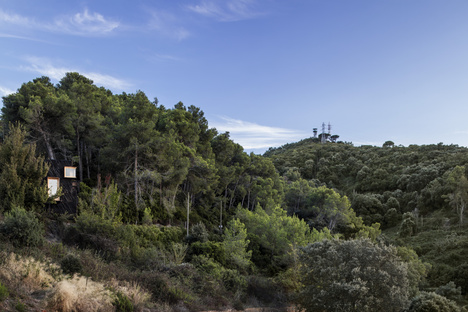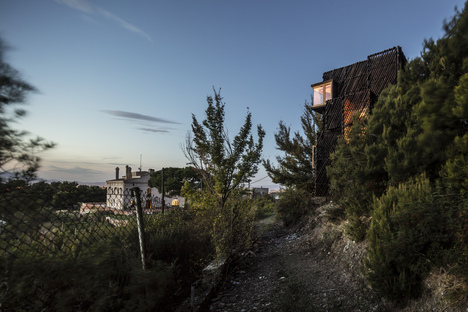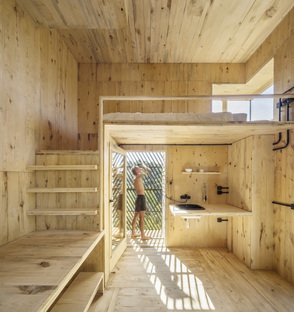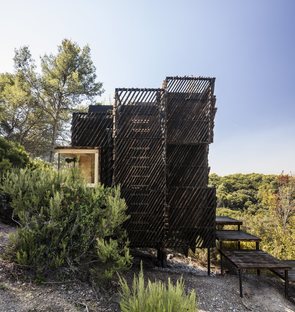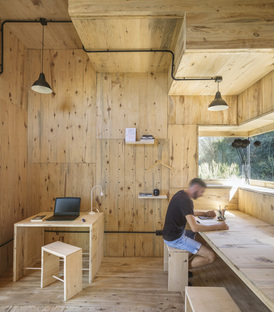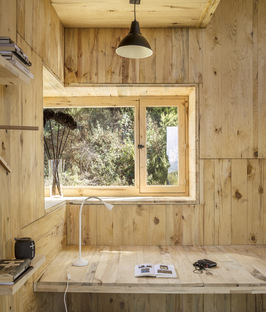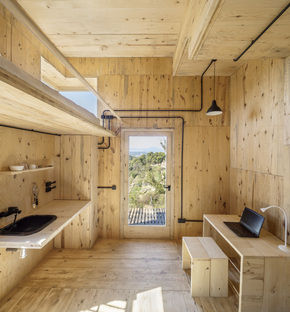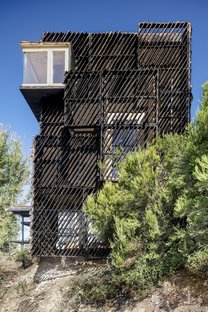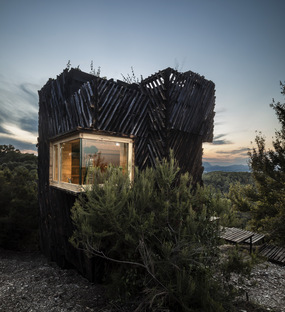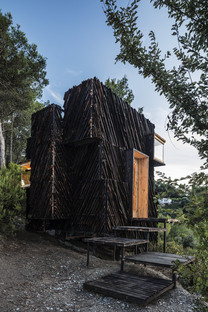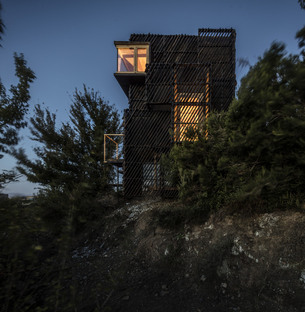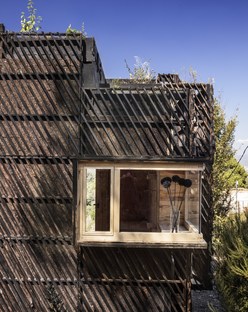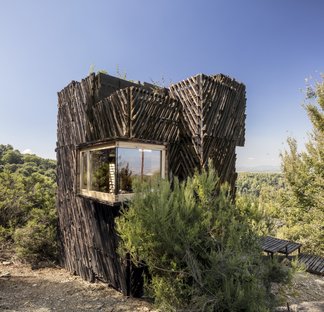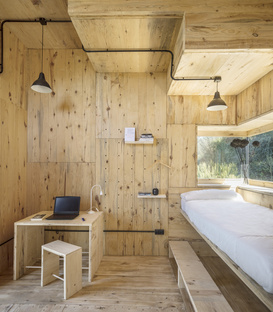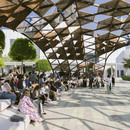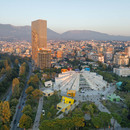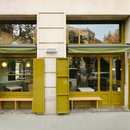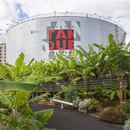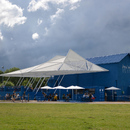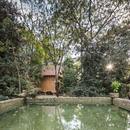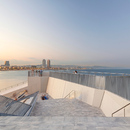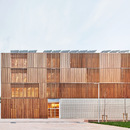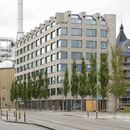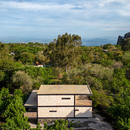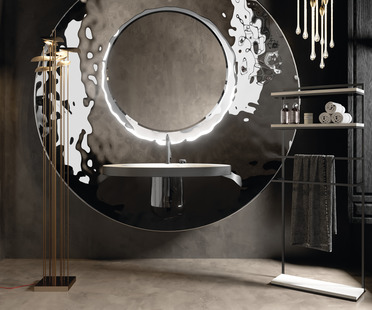- Blog
- Sustainable Architecture
- The Voxel, a prototype advanced ecological cabin
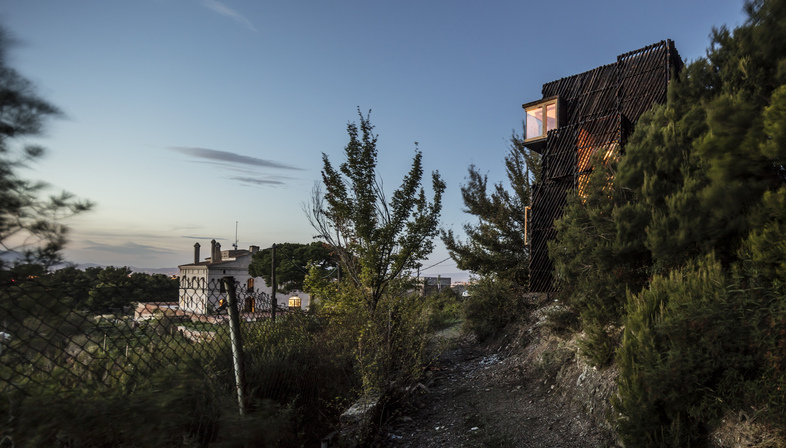 The Voxel is a virtuous example drawing on practically every possible or imaginable idea pertaining to sustainable construction, a prototype quarantine cabin designed for a single occupant in Collserola nature park, near Barcelona. This is the location of Valldaura Labs, a campus created by the Institute of Advanced Architecture of Catalonia (IAAC) focusing on research and education in self-sufficient habitats. The Voxel is the final project developed by a team of students and researchers in the Master in Advanced Ecological Buildings and Biocities (MAEBB) programme under the direction of Daniel Ibáñez and Vicente Guallart.
The Voxel is a virtuous example drawing on practically every possible or imaginable idea pertaining to sustainable construction, a prototype quarantine cabin designed for a single occupant in Collserola nature park, near Barcelona. This is the location of Valldaura Labs, a campus created by the Institute of Advanced Architecture of Catalonia (IAAC) focusing on research and education in self-sufficient habitats. The Voxel is the final project developed by a team of students and researchers in the Master in Advanced Ecological Buildings and Biocities (MAEBB) programme under the direction of Daniel Ibáñez and Vicente Guallart. The Voxel, meaning “volumetric pixel”, is a 12 square-metre cabin built with cross-laminated timber (CLT) made from Aleppo pine (Pinus halepensis). The wood used to build it was harvested within a radius of less than one kilometre from the construction site, milled, dried, processed and pressed on-site in Valldaura. The resulting panels were then joined without any metallic joints in order to use materials with a low carbon footprint.
On the basis of the principles of the circular economy, the structure was then wrapped in a layer of cork insulation and covered with a series of rainproof panels made from waste material created in the cross-laminated timber production process. Lastly, it was fire-treated using the Japanese Shou Shugi Ban method, giving the small construction an intriguing look while offering excellent natural protection against the elements.
To ensure liveability with a very small environmental footprint, The Voxel has three solar panels and an independent electricity accumulator designed specifically to supply electricity for lighting and appliances for a single resident. Its water system incorporates both rainwater collection and wastewater recycling. Sewage treatment takes place in a separate biogas system which generates fuel for cooking and heating the cabin as a by-product, as well as organic fertiliser.
The Master in Advanced Ecological Buildings and Bio-cities (MAEBB) is an immersive 11-month programme in which students learn about planning of ecological projects, parametric design techniques, and transformation of materials of local origin. The programme concludes with collective supervised design and construction of a small building, allowing students to experience for themselves all the stages involved in the process of construction and create green buildings for the future. The Voxel was built between April and August 2020, in the middle of the Coronavirus pandemic, with the participation of 17 students and 5 volunteers from 15 different countries. In conclusion, the project offers tangible proof that an advanced ecological architectural paradigm can be achieved with hyper-local materials and industrialised techniques, on the basis of the principles of the circular economy, all without sacrificing the beauty of the final result!
Christiane Bürklein
Directed by: Vicente Guallart & Daniel Ibañez
Academic Coordination by: Michael Salka
Developed by: Master in Advanced Ecological Buildings and Biocities students, class of 2020: Alex Hadley, Anfisa Mishchenko, Sena Kocaoğlu, Camille Garnier, Dania Aburouss, Ester Camps Bastida, Filippo Vegezzi, Giada Mirizzi, Juan Gabriel Secondo, Maitri Joy Uka, Camila Fajardo, Nathalie Botbol, Shreya Sharma, Yue Zhang, Zhiqian Liu, Rafael Abboud, Irene Rodriguez Perez
Hosted by: Valldaura Labs at the Institute for Advanced Architecture of Catalunya
Valldaura Management by: Laia Pifarré
Sponsored by: Saltoki, Miogás, Mausa, Distribució Sostenible, Bestiario, Henkel, Cork 2000 & Tallfusta
Guided by: Oscar Aceves, Miquel Rodriguez, Jochen Scheerer, Elena Orte, Guillermo Sevillano, Eduardo Chamorro, David Valldeoriola, Miguel Nevado, Jordi Prat, Gustavo Escudero
Assisted by: Bruno Ganem, Luis Leveri, Akshay Mhamunkar, Daniel Nahmias, Layth Sidiq, Kya Kerner
Images: Adrià Goula










